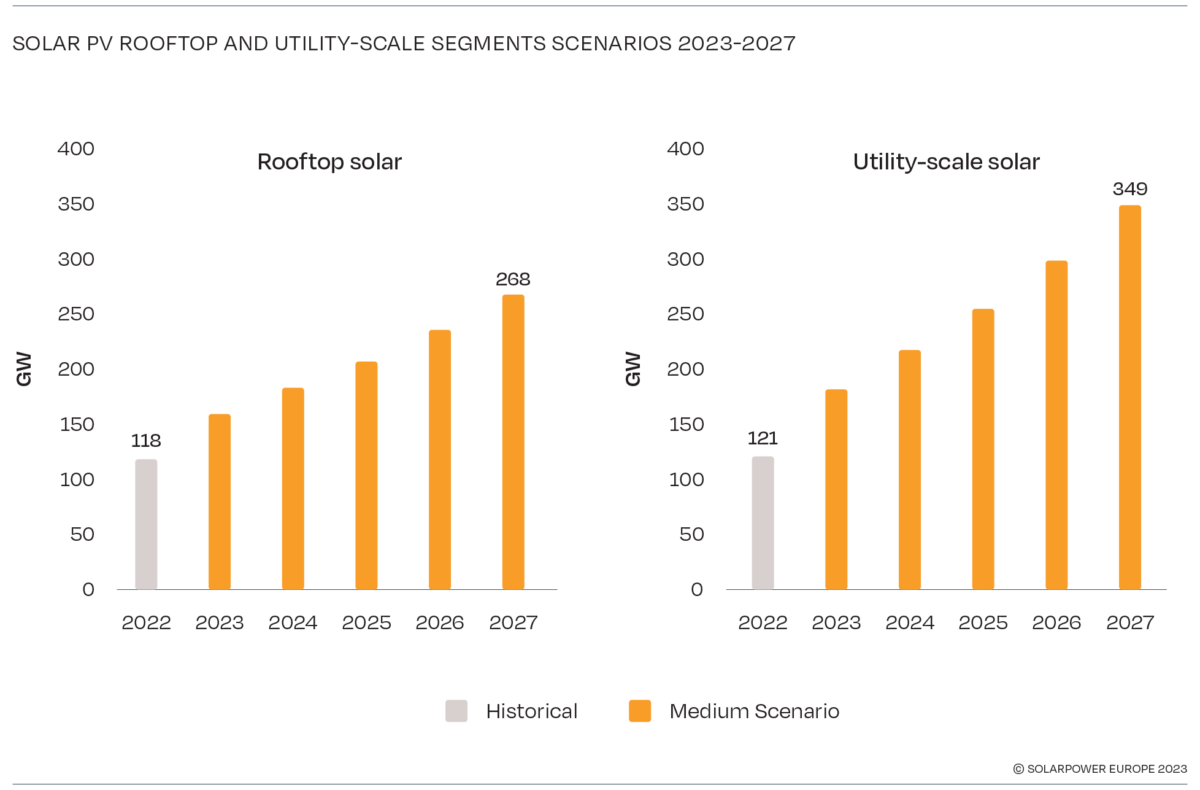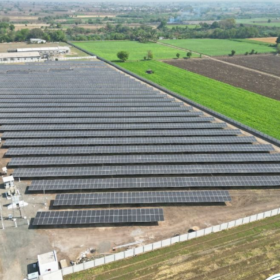From pv magazine Global
SolarPower Europe published the latest edition of its Global Market Outlook 2023-2027 during Intersolar Europe this week in Munich, Germany.
It says the world installed 239 GW of new solar capacity in 2022, equivalent to a 45% annual growth rate – the highest since 2016. It was another record year for solar, driven once again by China, with almost 100 GW added in a single year and a 72% growth rate. The United States held onto second place, despite a 6.9% drop in installations to 21.9 GW, followed by India with 17.4 GW, and Brazil with 10.9 GW. Spain is also becoming Europe’s largest PV market with 8.4 GW, according to SolarPower Europe. The figures differ slightly from other research firms. BloombergNEF, for example, said that global capacity additions hit 268 GW in 2022.
Overall, 26 countries added more than 1 GW of solar in 2022. These countries include China, the United States, India, Brazil, Spain, Germany, Japan, Poland, The Netherlands, Australia, South Korea, Italy, France, Taiwan, Chile, Denmark, Turkey, Greece, South Africa, Austria, the United Kingdom, Mexico, Hungary, Pakistan, Israel, and Switzerland.
The rooftop segment grew by 50% last year, with installations reaching 118 GW from 79 GW in 2021. Utility-scale solar grew by 41% to hit 121 GW, despite high module prices in 2021 and 2022.
“Large-scale systems remained the main contributor to the total capacity, but the shares of utility and rooftop solar have not been this close to each in three years; utility-scale contributed to 50.5% of total installations and rooftop contributed to 49.5%,” said SolarPower Europe.
Among the top 20 solar markets, Australia, South Korea, and Japan installed less rooftop solar compared to the previous year, with reductions of 2.3 GW, 1.1 GW, and 0.5 GW, respectively. However, all other top 20 markets posted growth in the rooftop segment.
“The most impressive progress could be witnessed in Brazil, which added an additional 5.3 GW. This giant 193% growth rate from 2021 was pushed by the rush of installations that sought to benefit [from] the generous conditions of the net-metering scheme before the rule changes in 2023,” said SolarPower Europe.
Italy and Spain posted rooftop market growth rates of 127% and 105%, respectively, driven by residential installations in Italy and self-consumption in Spain. Denmark, India, Austria, China, Greece, and South Africa all experienced rooftop growth rates exceeding 50%. China led the market with 51.1 GW of installed systems, accounting for 54% of its total installations in 2022.
SolarPower Europe predicts a 35% growth in the rooftop segment in 2023, with an anticipated addition of 159 GW. The figure could rise to 183 GW by 2024 and potentially reach 268 GW by 2027, according to the medium scenario. The growth will be more consistent compared to 2022, as it will be driven by energy prices returning to lower levels.
On a global scale, the utility-scale segment is expected to reach 182 GW in 2023, marking a 51% growth from the previous year. The forecast for 2024 is 218 GW, with further growth projected to reach 349 GW by 2027.
“The forecast is bright – between 341 and 402 GW of solar will be installed worldwide in 2023. From a total TW solar fleet today, the world could be installing 1 TW of solar annually by the end of the decade – hitting up to 800 GW per year already in 2027,” concluded SolarPower Europe.
This content is protected by copyright and may not be reused. If you want to cooperate with us and would like to reuse some of our content, please contact: editors@pv-magazine.com.








By submitting this form you agree to pv magazine using your data for the purposes of publishing your comment.
Your personal data will only be disclosed or otherwise transmitted to third parties for the purposes of spam filtering or if this is necessary for technical maintenance of the website. Any other transfer to third parties will not take place unless this is justified on the basis of applicable data protection regulations or if pv magazine is legally obliged to do so.
You may revoke this consent at any time with effect for the future, in which case your personal data will be deleted immediately. Otherwise, your data will be deleted if pv magazine has processed your request or the purpose of data storage is fulfilled.
Further information on data privacy can be found in our Data Protection Policy.